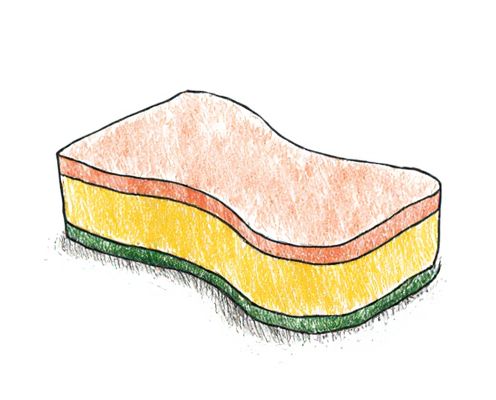
Eco-friendly sponge Illustration
Eco-friendly sponges are crafted from sustainable and biodegradable materials, reducing environmental impact significantly. These sponges offer excellent durability and absorbency, making them ideal for effective cleaning in kitchens without harmful chemicals. Choosing eco-friendly sponges supports waste reduction and promotes healthier home environments.
Introduction to Eco-Friendly Kitchen Sponges
Eco-friendly kitchen sponges are crafted from biodegradable materials such as cellulose, bamboo fiber, and natural sea sponge, reducing plastic waste and environmental impact. These sponges offer excellent absorbency and durability, making them effective for everyday cleaning tasks without releasing harmful chemicals. Choosing eco-friendly sponges supports sustainable living by minimizing landfill contribution and promoting renewable resource use in kitchenware.
Why Choose Sustainable Sponges for Your Kitchenware
Sustainable sponges offer a biodegradable alternative to traditional synthetic options, reducing plastic waste and environmental pollution in kitchenware care. Made from natural materials such as cellulose, coconut fibers, or bamboo, these eco-friendly sponges provide effective cleaning while minimizing chemical exposure. Choosing sustainable sponges supports greener kitchen practices and promotes a healthier home environment.
Popular Eco-Friendly Materials for Kitchen Sponges
Kitchen sponges made from cellulose, bamboo fiber, and coconut coir are among the most popular eco-friendly materials due to their natural biodegradability and effective cleaning properties. Cellulose sponges absorb water efficiently and break down quickly in compost, while bamboo fiber offers antimicrobial benefits and durability. Coconut coir sponges excel at scrubbing tough residues and are sourced from renewable coconut husks, making them an environmentally sustainable choice for kitchen cleaning.
Comparing Natural vs. Conventional Sponges
Natural sponges, derived from sustainable materials like cellulose or sea sponge, offer biodegradability and fewer chemicals compared to conventional synthetic sponges made from plastic polymers. While conventional sponges often harbor more bacteria due to their dense, non-breathable structure, eco-friendly sponges typically dry faster and resist odor buildup. Choosing natural sponges supports environmental sustainability by reducing plastic waste and minimizing toxin release during disposal.
Top Benefits of Eco-Friendly Sponges in Daily Use
Eco-friendly sponges offer superior biodegradability, reducing plastic waste and limiting environmental impact in your kitchen. These sponges are made from natural materials such as cellulose and plant fibers, ensuring they are safe for both food contact and your health. Using eco-friendly sponges promotes sustainability while maintaining effective cleaning performance for your daily dishwashing needs.
How to Choose the Best Sustainable Kitchen Sponge
Selecting the best sustainable kitchen sponge involves prioritizing biodegradable materials such as cellulose, coconut fiber, or bamboo, which minimize environmental impact while maintaining durability and absorbency. Opt for sponges free from synthetic chemicals and plastics, ensuring both safety for food contact and compostability after use. Consider sponges with antimicrobial properties to reduce bacterial growth and extend usability, supporting hygiene and reducing waste in eco-friendly kitchen practices.
Proper Care and Maintenance of Eco Sponges
Proper care of your eco-friendly sponge extends its lifespan and maintains hygiene by ensuring it is thoroughly rinsed and wrung out after each use to prevent mold growth. Regularly disinfecting with vinegar or microwaving a damp sponge for one minute destroys bacteria effectively. Storing your eco sponge in a well-ventilated area promotes faster drying, reducing odors and preserving its natural fibers.
Extending the Lifespan of Your Eco-Friendly Sponges
Proper care and regular cleaning significantly extend the lifespan of eco-friendly sponges by preventing bacterial buildup and material degradation. Using natural disinfectants such as vinegar or baking soda helps maintain the sponge's integrity while avoiding harsh chemicals. Storing sponges in a dry, well-ventilated area further reduces moisture retention, promoting durability and sustained performance in kitchen use.
Composting and Recycling: Disposing of Sponges Responsibly
Eco-friendly sponges made from natural fibers like cellulose or coconut coir are fully compostable, breaking down into nutrient-rich organic matter when disposed of in home compost bins. Recycling options for synthetic sponges remain limited, but some programs accept them for specialized processing to reduce landfill waste. Proper disposal methods, including composting biodegradable sponges and using designated recycling channels, significantly minimize environmental impact and promote sustainable kitchen practices.
Where to Buy the Best Eco-Friendly Kitchen Sponges for Women
Discover premium eco-friendly kitchen sponges designed specifically for women at sustainable retailers like Grove Collaborative and Package Free Shop, where products prioritize natural fibers and zero-waste packaging. Major online platforms such as Amazon and Etsy also offer a variety of biodegradable and compostable sponges made from cellulose, coconut husk, and bamboo, ensuring durability and environmental responsibility. Specialty stores like Whole Foods Market and local zero-waste shops provide curated selections that combine effective cleaning power with eco-conscious materials tailored for household kitchens.
 womendy.com
womendy.com